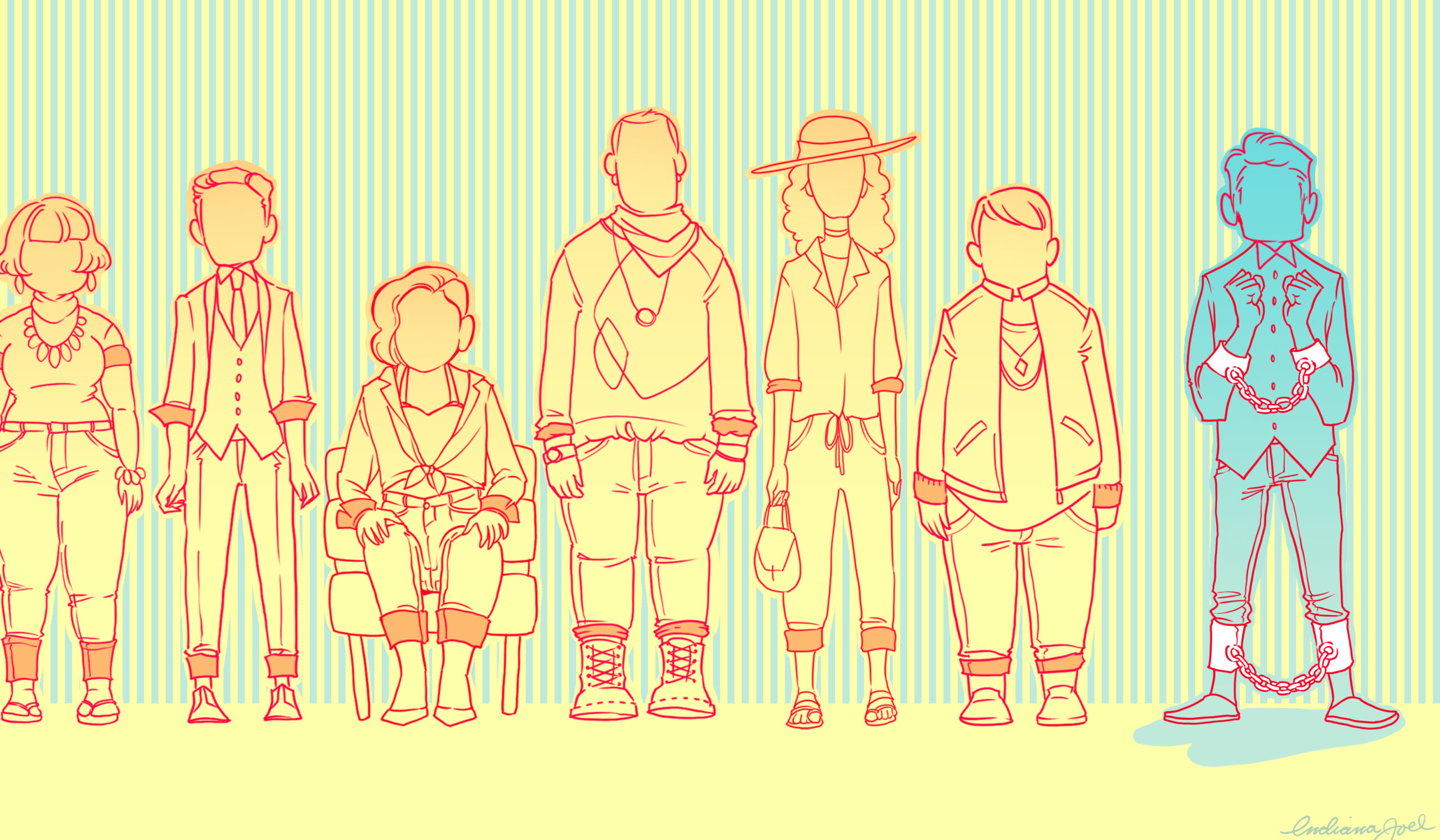I don’t cuff. It’s a look that works for some, but it has never appealed to me. In fact, I tried it a few weeks ago and was horrified to discover that it made my legs look even shorter than they actually are.
In June 2017, I stumbled across a now-deleted tweet by Twitter user remvslupin that read, “cuffing your jeans and tucking in baggy shirts is bisexual culture.” I was used to seeing tweets like this about gay or straight culture, but this was the first time I had come across one addressing my own identity.
Acknowledging the half-joking tone of the tweet, I nevertheless registered my inability to see myself within it, and moved on.
Well, so I thought. In the year since I saw that tweet, cuffing your pants as a representation of bisexual (bi) culture has become a meme. Like many things on the internet today, it started small, then suddenly became ubiquitous through the production of more and more viral tweets on the subject.
There are different reasons for cuffing. Some like the comfort it provides, while others enjoy showing off their nice socks. Regardless, though, it symbolizes or suggests that bi people are very conscious of how they present themselves in public, and that they are making deliberate choices that make them stand out from the crowd.
While it’s not surprising that bi people want to create a specific culture, it’s strange to find myself feeling like an outcast among outcasts. I was surprised to learn that these perplexing sartorial choices were supposed to be part of my identity.
Of course, it’s not really just about cuffing. Like not being able to drive or being bad at math, memes related to sexuality tend to spread because people see a kernel of truth in them, and fashion trends evolve in communities and expand within them where specific style decisions grow into something that feels like an affectation of one’s identity (watch as the “french tuck” explodes thanks to Queer Eye’s Tan France).
Bisexual culture is being created in real time online, catalogued at places like the “Bi Culture Is” Tumblr, where users submit ideas and examples. Recent additions include: “almost outing yourself on a pun,” “your eyes hurting from getting so little sleep” and “having a mental breakdown on your kitchen floor.”
Posts like these can have a strange effect because they either make you feel welcomed to or shunned from the community. Even scrolling through these tweets or posts on Tumblr, I find myself getting a jolt whenever one connects with me, however abstract or universal the sentiment actually is, because so many simply do not. It’s a reminder that marginalized identities also have their own sets of expectations, distinct from mainstream culture but potentially just as overwhelming.
I often find myself feeling left out, particularly because I’ve started to feel as though I’m not doing bisexuality right. I’ve been told that I’m not a real or proper bisexual person for various reasons, from not cuffing my pants to being in a heterosexual relationship. These social, online pressures might appear trivial when separated from each other, but when taken as a whole, it begins to feel as though there are passwords I’m not privy to.
By merely questioning the assertion of some so-called bi characteristics, I’ve risked feeling rejected by my own queer community. These social dynamics are, of course, different online than they are in my physical community, but the consequences are still real.
Bisexual individuals like myself are already forced to contend with a variety of expectations and presumptions that come from outside the LGBT community. We are told that we are just in a layover on our way to Gay Town, as Carrie put it on Sex and the City. In other words, we don’t exist.
We are also told that we are more likely to cheat. We are told that our sexual identity is directly tied to promiscuity and indecision. We are told when in a straight relationship that we aren’t bisexual anymore. We are told that we all like men and women the exact same amount. We are told that we are only attracted to binary genders, when in fact many of us reject the binary. We are even told, particularly as bisexual men, that we are more likely to spread HIV to women, which has been proven false. In other words, our lives are structured to begin with by the ignorance, intolerance and fear of others.
Much of this confusion occurs due to both heteronormativity and homonormativity. The former has us presume that everyone’s heterosexual, and that the norms and institutions built and maintained under that assumption (such as marriage and traditional gender roles) are worth enforcing and protecting.
The latter, by emphasizing our commonalities in the hope of promoting togetherness, actually helps to assimilate the LGBT movement into heteronormative structures, rather than challenging the oppressive norms forced upon them.
As a result, not only are most people equipped with this fundamental understanding of people in the world, but those within our own queer communities can also be caught up in that system, perhaps without even realizing it.
Sometimes when I tweet about my confusion over the latest viral tweet about bisexuality, some of the responses (even those made jokingly) from those in my own community question my authenticity as a bisexual man, as though challenging these preconceived notions of what that identity looks like is cause for suspicion.
My own queer community, then, can be just as alienating as mainstream hetero culture. It’s a complicated balance to strike, because there’s nothing quite as powerful as community-based bonding, but there’s also nothing like being alienated from the same community because you feel like you’re not meeting their expectations. The problem with determining the “culture” of any identity is that the act of definition is inherently exclusionary.
I think many in the LGBT community implicitly understand that there is not one right way to be lesbian, or gay, or bi, or trans, or any other identity, but we need to act like it. We may even understand the danger in homogenizing an already marginalized group into even narrower confines, yet still fall into the trap of reaffirming a good gay archetype or a good bi roadmap.
We must accept all those who refuse or reject these standards and expectations, and make sure we don’t further ostracize ourselves and our queer siblings from each other.
I saw someone the other day at the mall who was wearing cuffed jeans. “Cool socks,” I thought. Yet I didn’t feel a connection with them, and it didn’t seem obvious to me that they were part of my community. I kept walking and met my friend at a coffee shop, where we talked about our crushes on Cynthia Nixon. The more I thought about it, I realized that this undue pressure to conform may have been in part from the bisexual community on Twitter, but it was also self-inflicted.
I’m a good bi person because I’m following my own roadmap.
And that, for me, is bi culture.


 Why you can trust Xtra
Why you can trust Xtra


